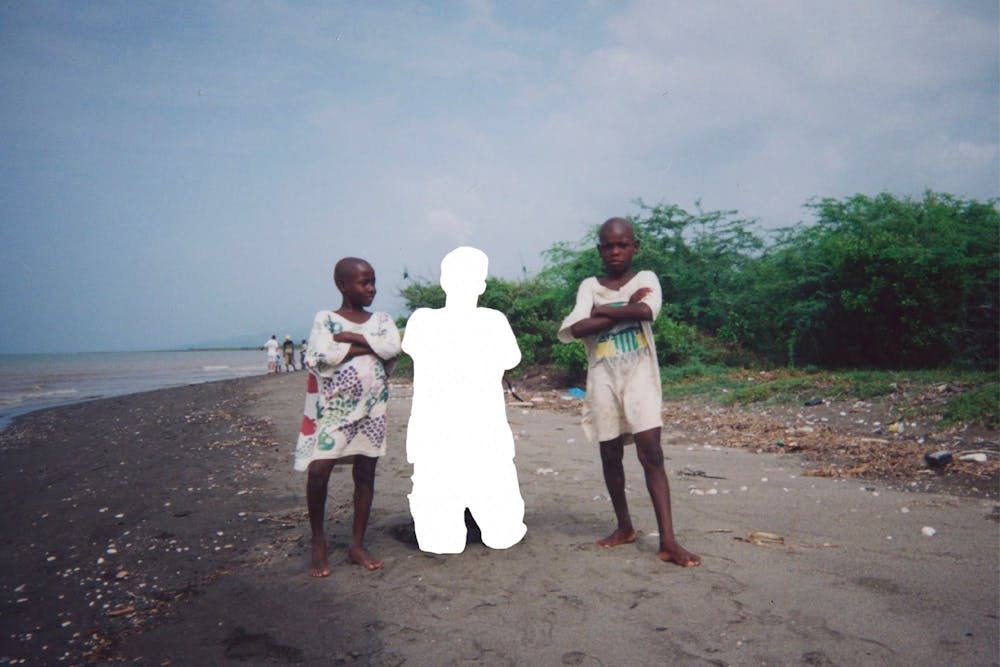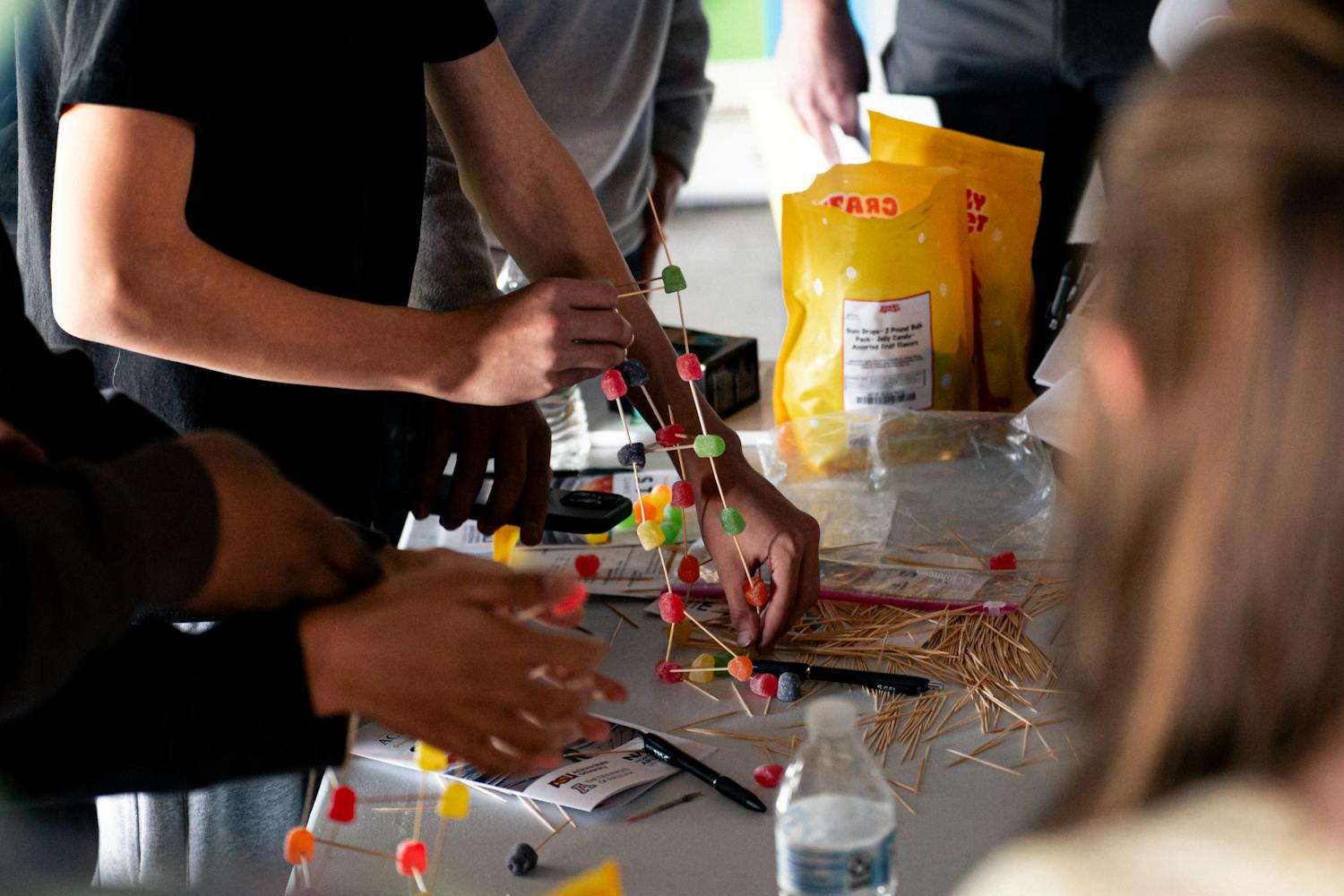Two decades ago, he packed his bag to leave the U.S. for a shortterm mission trip in Haiti.
He worked to build shelter for communities in the Caribbean country, and after one long day, he paused for a picture to capture the memory.
Two young Haitian boys stood on either side of him, arms crossed in an attempt to emulate his stance. The younger one smiled, and the other looked directly into the camera with his lips pursed together.
Jason Bruner described this as a “different part” of his life, one that many Christian Americans feel they are called to take part in by a higher power.
“A lot of these effects are often more measurable for American Christians rather than for those they are going to serve," he said.
A complicated history
Catholicism was first introduced to Haiti by a Spanish invasion in the 1500s. Protestant missionaries began to arrive in the late 1800s, bringing African slaves alongside them to create the first Episcopal church.
Bruner, associate professor of religious studies, said a lot of the contemporary organizations that still facilitate such trips find their institutional roots in this time period, a period that often carries “colonial baggage.”
The modern short-term missions movement stemmed from the explosion of such trips in the late 1800s, in which Protestants from the Western world traveled to Asia, Latin America and Africa.
A surge of these trips can be seen in the late 19th century following the Civil War as the steam engine and the construction of canals made streamlined travel possible
“This kind of expansion of Christian missionaries — and that’s Catholics as well as Protestants — sort of goes hand-in-hand with the technology,” Bruner said. “It goes hand-in-hand with social opportunity, and it goes hand-in-hand with other forms of Western expansion and influence, namely imperialistic national aims.”
American parachurch organizations bloomed in the 1890s. Bruner credited the faith-based nonprofits of this post–Civil War era, such as Campus Crusades and World Vision, with essentially democratizing the foreign missions movement. With child sponsorship programs and resource-based trips, Christian organizations placed emphasis on massive humanitarian relief work.
“They had this kind of fourfold purpose of being devotional, being evangelistic, being humanitarian but also being relational,” he said.
Bruner detailed memories of his own mission trips in the past. He paused and added, “I have tons of stories about very cringe-worthy things that happened on them.”
In 2005, 1.6 million Americans went abroad on mission trips, but the total number of those led by Western countries is elusive due to the diversity of options.
“You can go with this sense of calling and in some cases, it can lead to a decontextualized assumption about where you’re going,” Bruner said in reference to Christian missionaries who travel to Kenya, a country in which Christianity is already the prominent religion.
According to a 2011 study by Pew Research Center, the share of the population that was Christian in sub-Saharan Africa climbed from 9% in 1910 to 63% in 2010, while it rose from 3% to 7% in the Asia-Pacific region.
The same study found that about one in every four Christians lives in sub-Saharan Africa (24%), and about one-in-eight is found in Asia and the Pacific (13%).
A moving motive
A sense of calling is what drives many Americans to pursue missionary work, an event Bruner said some see as a rite of passage and part of their personal development.
“For a lot of churches, those sorts of trips become a regular part of the church calendar almost in the same way that Christmas and Easter and vacation Bible school do.”
He said short-term missions, for many, pose the opportunity for a first encounter with cases of severe poverty. Voyeuristic tendencies do not often create a symbiotic connection.
“As an American or as a Westerner, you have the freedom to leave. You’re in a position of power; you have the money that you can give, or not give,” Bruner said. “And so the relationships are often heavily imbalanced.”
“Poorism”, derived from poverty and tourism, has become a word many turn to when describing travelers’ fascination with how others survive in unfamiliar and more difficult circumstances.
A study titled “Global Voyeurism or Sustainable Ethical Practice?” by Lippincott Nursing Center stated that although tourism has the potential to raise the standard of living and engage poor populations in world economics in a meaningful and productive way, it also has the effect of further marginalization, citing no substantial improvement overall in impoverished countries.
Eugene Clay, associate professor of religious studies, argues that missions go beyond tourism.
“Many of the missionaries who came (to South Africa) in the 19th century brought with them ideas about organizing space and organizing time and certain kinds of bodily practices like washing and ideas about bodily hygiene,” Clay said.
He said the long-term relationships between these organizations and those they serve can build a foundation for advanced technological capabilities, although their complex history garners much criticism.
“These missionaries are sent by independent agencies, by churches, which, for the most part, don’t have a relationship to the state,” Clay said. “They’re nevertheless taking advantage of the colonized infrastructure that these imperial powers have established.”
He noted the limited duration of most short-term mission trips does not offer many opportunities to change the preconceived notions one might have of a place they are visiting.
“A [non-ordained church member] will be seeing everything through whatever the mission infrastructure is. Going for a week may simply reinforce certain kinds of stereotypes. It isn’t conducive,” he said.
Clay said he believes the current benefits outweigh the costs.
A 2016 Longitudinal Study of Aging by J Epidemiol Community Health found that individuals who volunteer have lower mortality rates than those who do not, even when controlling for age, gender and physical health.
Furthermore, Mayo Clinic published an analysis in 2017 that found that participating in service work improves mental health.
Service at home
For Andrew Ponder Williams, campus Minister for the United Church of Christ at ASU, mission trips have never been about an experience abroad.
Williams is an avid proponent of acting within one’s own community.
“Our state is in the middle of lots of lots of struggles with the environment and immigration,” Williams said.
Williams said UCC churches in Arizona and New Mexico often visit the U.S.-Mexico border to grant healthcare assistance, asylum support and connect with those who wish to build a relationship with the church.
“Our main focus is opportunities to go and be a loving, positive presence for other people (during) such a scary time in their life, as well as becoming more aware of the issues at hand, so that we can be more informed about it," he said.
Williams said that although UCC at ASU has yet to undertake environmental justice projects, he has plans to work to ensure ASU and the city of Tempe "adopt aggressive climate mitigation efforts."
He pointed out that the worst air quality in Phoenix and Tempe affects low income areas.
“All people are (of) sacred worth, and are beloved to God and deserve to be heard and deserve clean air and clean water and housing that’s safe and cool,” Williams said. “How do we bring up that climate change is going to make them more vulnerable?”
Read More: Photo Story: A look at ASU's diverse religious groups on campus
Some Christian groups have attempted online workshops over platforms like Zoom to maintain relationships with community members abroad.
Bruner said he questions whether or not these short-term online visits lead to substantial awareness about the cultures and nations people are traveling to.
“It’s just a different experience when you’re physically with someone, especially across cultures and languages, and so on, than it is talking over a computer or a phone,” he said.
Williams believes the impact of going on mission trips is often difficult to assume.
“It’s eye-opening for them, it helps them build skills and helps them grow in their compassion for others,” Williams said. “But at the same time, there’s challenges; like we never want to hurt when we think we’re helping. And that can be really difficult.”
He used the Native American community in Arizona as an example of a group that is often harmed by the assumption that providing resources comes in exchange for conversion to a religious group.
“It takes a lot of listening skills to listen to the communities that you feel called to serve and get to know their needs,” Williams said. “Not go in and say, ‘Hey, we’re Christians. We love everybody. We’re awesome. We want to build you all a school.’ Was that at the top of their list? Or did they need sustaining resources for education?”
Bruner said that although many disagree on the premise behind embarking on short-term missions, the impact for those who serve can be helpful.
“For a lot of people, it’s kind of through the lens of these trips that they feel like their faith is most clearly or meaningfully actualized in a global way,” Bruner said.
Reach the reporter at ivcrespo@asu.edu or follow @ziacrespo on Twitter.
Like The State Press on Facebook and follow @statepress on Twitter.




